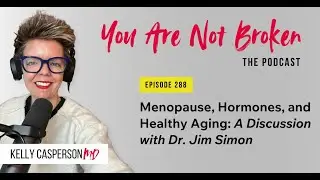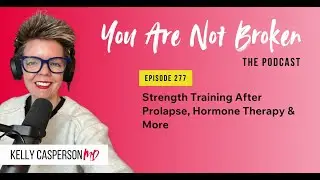Menopause, Hormone Therapy, and GI Health: A Q&A with Dr. Kelly — You Are Not Broken Podcast
In this episode, Dr. Kelly Casperson answers various questions from her Instagram followers. She addresses topics such as strength training after prolapse repair, the effects of menopause on gastrointestinal health, PTNS for urgency incontinence, optimal hormone levels for women in their 60s, 70s, and 80s, arguments for testosterone supplementation in perimenopausal women, side effects of testosterone supplementation, and safe options for hormone replacement therapy. She also discusses the differences and treatments for cystocele and rectocele, the use of progesterone after a hysterectomy, the risk of blood clots from estrogen patches, and the use of estradiol on the face causing pigmentation. Dr. Casperson emphasizes the importance of personalized hormone therapy and the need to consult with hormone specialists for individualized treatment plans.
Takeaways
Strength training is possible after prolapse repair, but it is important to consult with a physical therapist and ensure that the pelvic floor and core are evaluated to prevent injury.
Menopause can affect gastrointestinal health, and hormone replacement therapy may help alleviate symptoms such as bloating and GI changes.
PTNS (peripheral tibial nerve stimulation) can be an option for urgency incontinence, but other treatments like Botox or sacral neuromodulation may be more effective.
There is no specific optimal hormone level for women in their 60s, 70s, and 80s, as individual needs vary. Personalized hormone therapy should be based on symptoms and individual response.
Testosterone supplementation can have multiple benefits for perimenopausal women, and arguments for it include improved mood, sleep, and overall well-being.
Side effects of testosterone supplementation, such as acne and hair loss, are generally minimal with physiologic or slightly above physiologic female doses.
Transdermal hormone replacement therapy is generally safer for women with blood clotting issues.
Progesterone is important for women with a uterus to protect the endometrial lining, but its use can vary depending on individual circumstances.
Estrogen applied to the face may cause pigmentation issues in some individuals, particularly those prone to melasma.
Hormone therapy should be personalized and individualized, and it is important to consult with hormone specialists for proper evaluation and treatment.
---------
Chapters
00:00 Strength Training After Prolapse Repair
02:51 Effects of Menopause on Gastrointestinal Health
04:59 Optimal Hormone Levels for Women in Their 60s, 70s, and 80s
08:23 Side Effects of Testosterone Supplementation
10:38 Safe Options for Hormone Replacement Therapy
12:32 Progesterone Use After Hysterectomy
14:17 Risk of Blood Clots from Estrogen Patches
19:23 Effects of Estradiol on Facial Pigmentation
---------
Pre-order my book now! https://www.amazon.com/You-Are-Not-Br...
And get access to two webinars led by Dr. Kelly. Click below to get info about the webinars!
https://kellycaspersonmd.com/you-are-...
---------
Subscribe: / @kellycaspersonmd
Check out my website: https://www.kellycaspersonmd.com
Listen to the podcast:
Spotify: https://open.spotify.com/show/4iZ4pa5...
Apple: https://podcasts.apple.com/us/podcast...
---------
Follow Me:
Instagram: / kellycaspersonmd
Threads: https://www.threads.net/@kellycaspers...
Facebook: / youarentbroken
---------
Take my NEW Adult Sex Ed Master Class: https://kellycaspersonmd.com/adult-se...
Join my membership to get these episodes ASAP, a private facebook group to discuss and my private accountability group for your health, hormones and life support!
https://www.kellycaspersonmd.com/memb...
Watch video Menopause, Hormone Therapy, and GI Health: A Q&A with Dr. Kelly — You Are Not Broken Podcast online, duration hours minute second in high quality that is uploaded to the channel Dr. Kelly Casperson, M.D. 15 August 2024. Share the link to the video on social media so that your subscribers and friends will also watch this video. This video clip has been viewed 2,890 times and liked it 136 visitors.








![Talking with Co-Producer of The [M] Factor Documentary, @TamsenFadalTV](https://images.reviewsvideo.ru/videos/VKowjbbL9RQ)










